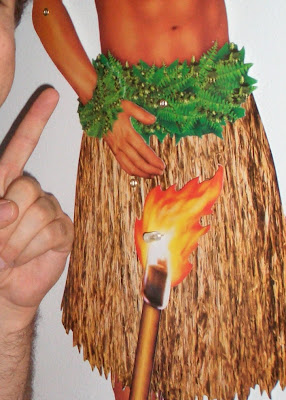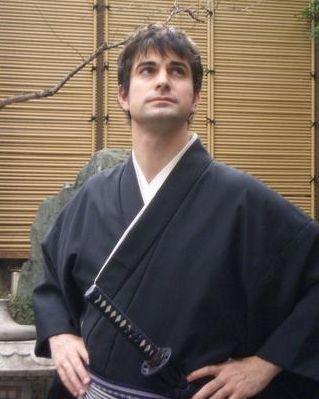South Africa has legalised same-sex marriage - but despite this pioneering measure, the rest of the continent remains one of the most homophobic places in the world
By Alex Duval Smith
Published: 21 November 2006
Deep in the Sahara one of the world's most extraordinary tribal exhibitions takes place every year when young men of the Wadabi tribe adorn themselves with beads and face paint to woo their future wives.
At the end of the all-night ceremony the most effeminate of them all is given the pick of the virgins. This extravaganza in Niger is considered to be one of Africa's most treasured heterosexual rituals. But almost anywhere else on the continent, any flirting with sexual boundaries is deeply taboo. Being gay in Africa is not easy.
When the South African parliament voted last week to legalise same- sex marriage, Mongezi Chirwa, a resident of Alexandra, near Johannesburg, was quick to pipe up that he was looking forward to becoming one of the first men to tie the knot with his boyfriend.
His declaration came shortly after Lindiwe Radebe, 25, and Bathini Dambuza, 22, two women from Soweto who have been engaged for a year, went public on television about their decision to be wed.
The debate that followed in the South African media was not so much centred on the old arguments that homosexuality is an "abomination" brought to Africa by the colonisers. Neither has there been much quoting of Zimbabwean President Robert Mugabe's view that gays and lesbians are "worse than dogs and pigs".
Guardians of tradition, such as Mr Chirwa's grandmother and spiritual healer Nokuzola Mndende, argue that the real problem presented by the new South African law - which is expected to be passed by the National Council of Provinces before being signed into law on 1 December - is that it is going to be difficult for African families to adapt their traditional rituals to their new gay and lesbian in-laws.
Mrs Mndende, who is the director of the Icamagu Institute, said: "There's the issue of lobolo [dowry]. Normally the man pays it. In this case, who is going to pay?" She added that when a man announces that he wishes to marry a woman, the families meet and an unozakuzaku is formed - a delegation that negotiates lobolo for the groom. "Who is going to be unozakuzaku?" she asked.
Mrs Mndende is disappointed that South Africa's black-led government - which passed the Civil Union Bill by 230 votes to 41 - is setting out to "destabilise tradition".
But according to Mogezi Guma, of the Commission for the Promotion and Protection of the Rights of Cultural, Religious and Linguistic Communities, traditional practices are inventions which can easily be adapted. "Communities have always accommodated emerging challenges. For instance, cattle were used before as a way of paying lobolo but today money and cheques and receipts are exchanged." Africa remains one of the most homophobic places in the world and even in South Africa - with the exception of gay tourism spots in Cape Town - it is not advisable for same-sex couples to walk hand-in- hand in the street. There are occasional moments of liberation from this rule, such as during Johannesburg's annual gay pride event, which has been staged every September for the past 16 years. Zimbabwe's annual Jacaranda Ball was a similar event, until the drag queens got too frightened to go out of doors.
African archbishops, especially Nigeria's Peter Akinola who has 17 million Anglicans in his flock, have led the schism in the Anglican Communion since the election of Gene Robinson, a gay bishop in New Hampshire, in 2003. Churches in Kenya, Tanzania and Uganda have followed suit, principally by refusing grants from the American Episcopal Church. Critics of the South African Civil Union Bill point out that its fatal flaw is that religious leaders may still, on grounds of "conscience, religion and belief" refuse to officiate at same-sex weddings. The churchmen have been supported by politicians such as Ugandan President Yoweri Museveni, who last year changed the constitution to introduce a ban on same-sex marriage. A radio station that invited three activists to comment on the ban was fined 1.8m shillings (£800).
In Nigeria - which enforces powerful anti-homosexual laws from the colonial era, including five years' jail for consenting sex without the option of a fine - the Federal Executive Council also approved a bill in January seeking to outlaw gay marriage. In October 2004, a Sierra Leonean lesbian activist, Fannyann Eddy was raped and savagely beaten, and died from a broken neck, after being assaulted in her office. A man was arrested but escaped from detention.
In Cameroon, 11 men are currently in prison on the basis of their presumed sexual orientation after nine of them were found guilty of sodomy and sentenced to 10 months' imprisonment at a trial in June. At a separate court hearing, four suspected lesbians were given suspended six month sentences for "sodomy". At the same time, Cameroon's media has launched an aggressive "outing" campaign. Its victims have included the Franco-Cameroonian former tennis star Yannick Noah, 45, the singer Manu Dibango and two cabinet ministers.
In Zimbabwe, the ritual homophobic destruction of the gay and lesbian stand at the Harare International Book Fair took place again this August. President Mugabe believes that "gay gangsters" - some of whom he sees belonging to the British Government - are conspiring for regime change.
In Ghana, four men were jailed for two years in 2004 for alleged "unnatural acts". Gays and lesbians in the west African country still only agree to speak anonymously about their experience. One man said: "People imagine that gays are paedophiles and criminals. You are taunted as a child. I had a friend who was recently told he was evil and would not go to heaven. Pentecostal churches perform exorcism rites on people seen as being gay. I was beaten up a couple of years ago. I met this guy on the beach and agreed to meet him at the market. When I got there several men and women accused me of forcing their friend to have sex. They beat me and took everything I had.
"They said gays were evil people who made God destroy Sodom and Gomorrah. They said they would beat out of me the evil spirit of homosexuality."
African homophobes justify their actions with the claim that homosexuality is a white colonial import. The former Kenyan president Daniel Arap Moi said it himself in 1999: "It is against African tradition and biblical teachings, I will not shy from warning Kenyans against this scourge." The Namibian former president Sam Nujoma said: "Homosexuals must be condemned and rejected. Homosexuality is a behavioural disorder that is alien to African culture".
But activists say homosexuality and gender-bending is as old as Africa. They say that what came with the colonisers was homophobia in the shape of morally charged legislation that aimed to tame "savage" practices such as shows of affection between people of the same sex. Activists quote the Garawal - the annual extravagant marriage ritual of the flamboyant Wadabi tribe. Historians say that in ancient traditional communities homosexuality - which in the Shona language of Zimbabwe has a name, ngochani - was widespread and acceptable. Men who wished to adopt traditional female roles and who found male partners were not frowned upon because they did not represent a threat to other men. Same-sex relationships only came under threat at times of extreme poverty or famine when there was an urgent need for procreation.
But if South Africa last week became the first country in Africa to legalise same-sex weddings it is not because the country has a better grasp than others on African anthropological history. It is because the country has an organised gay and lesbian movement - including influential websites (such as mask.org.za) that have provided a lung of expression for people in all English-speaking African countries - and political influence. It was as a result of a case brought by gay and lesbian campaigners that the South African Constitutional Court last year gave the government until 1 December to create the Civil Union Bill that legalises same-sex weddings.
Despite its lobbying power, the South African gay and lesbian lobby would not be where it is today without a man called Simon Nkoli, to whom the ruling African National Congress owes a profound debt of gratitude.
Nkoli, who was 41 when he died from an Aids illness in November 1998, united black and white gays and lesbians and initiated the first South African Pride march in 1990. More importantly, as an anti-apartheid campaigner, he spent four years in jail with leading ANC figures Popo Molefe, Frank Chikane and the current Defence Minister Mosiuoa "Terror" Lekota. Nkoli profoundly influenced the future decision-makers who were his fellow inmates to incorporate gays and lesbians in the dream they held for a democratic South Africa, free from all forms of discrimination.
The playwright Robert Colman, who has written about Nkoli's life, said the gay activist had a profound impression on the other prisoners. "There was a scandal in the prison when a warder delivered a note which was proof that one of the treason triallists was arranging a meeting for sex with a common-law prisoner. Political prisoners at the time had a code of conduct whereby they did not indulge in those practices. They set themselves above other prisoners because they did not see themselves as criminals.
"The issue of the note had to be discussed among the 22 political prisoners. Because of the homophobic reaction of some of the men, Simon came out. This step confronted the other prisoners with a dilemma. Some of them thought Simon would turn state witness. They thought the state would use Simon's sexuality as a weakness to manipulate him with. I believe that incident had a very direct bearing on the equality clause in the South African constitution."
Last week, before the vote in South Africa's parliament, the Home Affairs minister Nosiviwe Mapisa-Nqakula said the Civil Unions Bill marked another step in the country's rejection of its brutal past. Ahead of a vote in which all ANC MPs were required to vote, she sought to shift the debate's focus from the emotional to the intellectual.
"The challenge that we continue to face has to do with the fact that when we attained our democracy we sought to distinguish ourselves from an unjust painful past, by declaring that never again shall it be that any South African will be discriminated against on the basis of colour, creed, culture and sex."
Mr Lekota, an unrepentant heterosexual, told MPs: "The question is not whether same-sex marriages or civil unions are right or not. It is whether South Africa is going to suppress same-sex partners or not.
"Men and women of homosexual and lesbian orientation joined the ranks of the democratic forces in the struggle for liberation. Same-sex unions should be afforded similar space as heterosexual marriages in the sunshine of democracy," said Mr Lekota.
.
.
Africa and homosexuality
SOUTH AFRICA
On 14 November South Africa became the first African nation to legalise same-sex marriage. Under apartheid, sex between men was outlawed. Even today 63 per cent believe that homosexuality should not be accepted.
ZIMBABWE
Male homosexuality is illegal and since 1995 President Robert Mugabe has pursued a "moral campaign" against homosexuals. He has said being gay is a "white disease". "Unnatural sex acts" carry a penalty of up to 10 years in prison.
GHANA
Male homosexual activity is illegal. Gay men can also be punished under provisions concerning assault and rape, if "in public or with minor". Two months ago a gay rights conference was banned.
MOROCCO
Homosexuality is illegal and can be punished with up to three years in prison and a fine of up to £75, but the law is seldom enforced, and homosexual activity is fairly common, especially in the resorts.
CHAD
There is no law against being gay. Homosexual behaviour is not mentioned as a criminal offence in the penal code. However, homosexuality is considered immoral and is a taboo subject.
ETHIOPIA
The law prohibits homosexual acts by both sexes, with a penalty of up to three years in prison. This may be increased by five or more years when the offender "makes a profession of such activities".
EGYPT
There are no laws against homosexuality, but it has started to become illegal de facto under various laws such as "offences against public morals" and "violating the teachings of religion".
KENYA
Homosexual behaviour is banned between men, which is referred to as "carnal knowledge against the order of nature". The penalty is five to 14 years' imprisonment. The age of consent is 16. Lesbian relations are not prohibited by law.
.
The Independent










